- Home
- Graham McNeill
The Legend of Sigmar
The Legend of Sigmar Read online
The Legend of Sigmar
By
Graham Mcneill
Product Description
Sigmar is the greatest leader of men the world has ever known. By saving the high king of the dwarfs, he earned the eternal friendship of the mountain folk. When a mighty horde of orcs threatened his lands, he united the tribes of men to stand against them at Black Fire Pass. He broke the siege of Middenheim and pushed back the forces of Chaos. In defeating the great necromancer Nagash, he saved mankind and secured the future of his empire. His deeds are legend. This is his story.
This is a dark age, a bloody age, an age of daemons and of sorcery. It is an age of battle and death, and of the world’s ending. Amidst all of the fire, flame and fury it is a time, too, of mighty heroes, of bold deeds and great courage.
At the heart of the Old World lie the lands of men, ruled over by bickering tribal chieftains.
It is a land divided. In the north, King Artur of the Teutogens surveys his rivals atop the mighty Fauschlag Rock, whilst the berserker kings of the Thuringians know only war and bloodshed. It is to the south that men must look for succour. At Reikdorf dwell the Unberogens, led by the mighty King Björn and his fated son, Sigmar. The Unbergens seek a vision, a vision of unity. The enemies of man are many and if men cannot overcome their differences and rally together, their demise is assured.
To the frozen north, Norsii raiders, barbarians and worshippers of Dark Gods, burn, slay and pillage. Grim spectres haunt the marshlands and beasts gather in the forests. But it is in the east where dark forces are moving, and the greatest threat lies. Greenskins have ever plagued the land and now they march upon the race of man in their numberless hordes with a single purpose—to eradicate their foes forever.
The human kings are not alone in their plight. The dwarfs of the mountains, great forge smiths and engineers, are allies in this fight. All must stand together, dwarf and man for their mutual survival depends on it.
Table of Contents
Map
Introduction
Heldenhammer
Dedication
BOOK ONE: Forging the Man
One: Battle’s Eve
Two: Astofen Bridge
Three: Morr’s Due
Four: Sword Brothers
Five: The Dreams of Kings
Six: Partings and Meetings
BOOK TWO: Forging the King
Seven: All our People
Eight: Heralds of War
Nine: Those Left Behind
Ten: Red Dawn
Eleven: The Grey Vaults
Twelve: One Must Pass
Thirteen: A Gathering of Kings
BOOK THREE: Forging the Legend
Fourteen: Vengeance
Fifteen: Union
Sixteen: To be a King
Seventeen: Chains of Duty
Eighteen: Skaranorak
Nineteen: The Swords of Kings
Twenty: Defenders of the Empire
Twenty-One: Black Fire Pass
Twenty-Two: The Death of Heroes
Twenty-Three: Birth of an Empire
Glossary
Empire
Dedication
Book One: Empire of Hope
One: The Last Days of Kings
Two: Rise an Emperor
Three: Reckonings
Four: City of Mist
Five: Daemon Moon
Six: Troublesome Kings
Seven: The Namathir
Eight: A Darkness of the Heart
Book Two: Empire of Blood
Nine: Northern Fire
Ten: Curse of the Dead
Eleven: The Mountains of Fear
Twelve: The Battle of Brass Keep
Thirteen: A Warning Unheeded
Fourteen: Sigmar’s Justice
Fifteen: The Price of Betrayal
Sixteen: The Temptation of Sigmar
Book Three: Empire of War
Seventeen: Wolves of the North
Eighteen: The Empire at Bay
Nineteen: Heroes of the Hour
Twenty: The Last Days
Twenty-One: The Last Day
Twenty-Two: The Doom of Men
God King
Dedication
BOOK ONE: Danse Macabre
One: Fire and Retribution
Two: Young Minds and Old Men
Three: Flight and Fight
Four: New Friends and Old Enemies
Five: Homecomings
Six: Dead Flesh
BOOK TWO: Down Among the Bone Men
Seven: Portents of Death
Eight: The First to Die
Nine: Darkness Closes In
Ten: Creeping Death
Eleven: Unwelcome Guests
Twelve: Three Thrusts to the Heart
Thirteen: The Next to Die
Fourteen: North, East and West
BOOK THREE: Dust to Dust
Fifteen: Reunions
Sixteen: Murder Most Foul
Seventeen: The Price of Knowledge
Eighteen: The Dead of Reikdorf
Nineteen: The Last Night
Twenty: The Battle of the River Reik
Twenty-One: The End is Nigh
Twenty-Two: Champions of Life and Death
Twenty-Three: The End of All Things
Epilogue
Let The Great Ax Fall
Sword Guardian
About The Author
Introduction
If you’re going to choose a legendary character from the history of Warhammer to write a novel about, which one springs to mind? For me it was always Sigmar, the mythical founder of the Empire who went on to become a living god. Who else in the panoply of heroes can lay claim to that kind of honour? Sure, there are High Elf heroes that have saved the world and undying necromancers that have tried to end it, but when you’re already practically a god, or have access to the most powerful magic in the world, it’s perhaps not all that difficult to be legendary.
But when all you have is the strength in your sword arm and the fellowship of your brothers, a man has to dig deep within himself to become a hero. Sure, Sigmar has a magical warhammer, but that’s not the source of his power, it only adds to what’s already there. And that lies at the heart what attracted me to the character of Sigmar. He was just a man. Nothing more, nothing less. Living in a land forever under the shadow of orc invasion from the east, raiders from the north and riven with tribal warfare, humankind existed on a precarious knife’s edge a hair’s-breath away from extinction. Though Sigmar was the son of a mighty chieftain, he had none of the superlative qualities of long life, strength or skills with which many of the older races were blessed. He had something better, something no one else had. He had vision.
Sigmar saw that the internecine wars between the tribes would ultimately doom them. With foes in every direction, what hope could there be if every tribe counted the others as enemies? I loved the idea and knew there was real mileage in exploring what made a man cling to a vision no one else could see. Overcoming the entrenched notion that the tribes would always be enemies to one another and uniting such disparate forces as the frenzied warriors of the Berserker King or the warrior women of the Asoborns under one banner would be no easy task, but Sigmar had his sights on nothing less than an Empire of Man ruled over by a powerful Emperor. Only then would the lands of man be safe.
Of course as altruistic as this all sounds, let’s not forget that Sigmar saw himself as that Emperor, and not everyone was going to share his vision. And those who didn’t wouldn’t be welcome in his empire… In telling the legend of Sigmar, it was immediately obvious that there was a lot of existing lore to incorporate into the novel, and I delved into the vaults of Games Workshop to uncover every morsel
of information gathered in ancient issues of White Dwarf, old Army Books, role-play supplements and the like. A lot of information I uncovered was fragmentary, contradictory or woefully out of date, but rather than seeing that as a problem, I looked at it as a opportunity. I had all this information about a heroic character who lived two and a half thousand years before the current Warhammer time period, and it was only right and proper that there would be elements of the narrative that didn’t fit neatly together. The challenge would be to tell a compelling narrative that explored the nature of a man driven to bring an entire land under his control, and do it in a way that felt realistic and worked within what we knew of him. It’s easy to write something in a broad swathe of hyperbolic descriptions that represents incidents from thousands of years ago, but to actually write that scene in a novel, with real characters talking and interacting is quite different. This is a character about whom legends have been told and which have grown over thousands of years in the telling.
Heldenhammer was the first book that came out of this, and I’d always envisaged it as a stand-alone book, a telling of Sigmar’s unification of the Empire and the awesome fury of the Battle of Black Fire Pass with a postscript at the end telling what happened to him at the end of his reign. But that’s not how it turned out, and the more I wrote the story, the more I knew I wanted to tell stories beyond that battle. After all, winning an empire is only half the battle. Keeping it is quite another. The existing timeline for Sigmar was teasingly dotted with one line references to other battles, other trying times, and other legends. I wanted to tell those stories, and thus the postscript was jettisoned from Heldenhammer, and another book was planned. That book was Empire, and it dealt with how Sigmar coped with being Emperor, and whether it lived up to his expectations. And, more importantly, how he lived up to his people’s expectations. After all, he’d promised them a great deal, and now it was time to live up to those promises of peace and unity.
But peace and unity are not the lot of men in the Empire, and as old foes rear their head and new enemies look upon what Sigmar has built with envious eyes, war is never far beyond the horizon. Empire went on to win the David Gemmell Legend Award in 2010, which was a huge thrill for me, and an honour worthy of Sigmar himself. As I type this, I’m looking up at the ax I won, and have a warm, tingly feeling in my fingertips. In case I didn’t say it enough at the time, a huge thank you to everyone who voted for Empire.
God King is the final book in this omnibus, and it deals with a collision of legendary characters, a climatic battle to the (un)death between Sigmar and Nagash. This was the tale I planned to finish with, the culmination of Sigmar’s legend where I’d finally get to you use the postscript I’d written way back when I finished Heldenhammer. I was saying that all through the writing of God King, or at least until I realised I was leaving lots of breadcrumbs in my wake to be nibbled at later. I was setting up characters and plot lines that were just begging to be told in fresh stories, and by the time I got to the Battle of the River Reik, I knew I wasn’t done with Sigmar and the postscript went back into the drawer.
So, these novels are the first in what I fully expect to an epic retelling of Sigmar’s legend, which will go on to become a fitting saga for such a mighty hero. There will be more battles fought, more blood shed, more sacrifices made and more heroism before we get to that postscript.
For Sigmar and the Empire!
Graham McNeill
September 2011
To DG. You taught me all I know.
BOOK ONE
Forging the Man
When the sun rests
And the world is dark
And the great fires are lit
And the ale is poured into flagons
Then is the time to sing sagas as dwarfs do
And the greatest of sagas
Is the saga of Sigmar, mightiest warrior.
Harken now, hear these words.
And live in hope.
One
Battle’s Eve
The faint sound of songs and proud boasts guided the two boys as they scampered across the hard earth of the darkened settlement towards the longhouse at its centre. Their movements were furtive and cautious as they negotiated their way between high, timber walled buildings, and past the fish drying racks and the warm walls of the smithy. Neither boy wanted to be discovered, especially now that guards had been set on the walls and night had fallen.
Despite the threat of a beating at this trespass, the excitement of their intrepid raid into the heart of Reikdorf threatened to give both of them away.
‘Be quiet!’ hissed Cuthwin as Wenyld clattered against a previously unseen pile of planed timber, stacked against the woodworking store.
‘Quiet yourself,’ returned his friend, catching the timber before it could fall as both boys pressed their bodies flat against the wall. ‘There’s no stars or moon. I can’t see a thing.’
That at least was true, allowed Cuthwin. The night was utterly dark, the hooded braziers on the settlement’s walls casting a crackling orange light out into the forests beyond Reikdorf. Sentries circled the settlement within the ring of light, their bows and spears trained on the thick forests and darkened shoreline of the Reik.
‘Hey,’ said Wenyld, ‘did you hear what I said?’
‘I heard,’ said Cuthwin. ‘It’s dark, yes. So use your ears. Warriors aren’t quiet the night before riding to war.’
Both boys stood as still as the statue of Ulric above Reikdorf’s gate, and let the sounds and smells of the night wash over them, each one telling a story of the village they lived in: the groan of settling iron as Beorthyn’s forge cooled and creaked from a day’s work, producing iron swords and axe blades; the sounds of wives speaking with low, worried voices as they wove new cloaks for their sons, who rode to battle at daybreak; the whinny of stabled horses; the sweet smell of burning peat, and the mouth-watering aroma of cooking meat.
Over it all, Cuthwin could hear the open wash of the river as a constant rustle of water against the mud flats, the creak of wooden fishing boats as they moved with the tide, and the low moan of wind through the hung nets. It sounded sad to him, but night in the land west of the mountains was often a time of sadness, a time when the monsters came from the forests to kill and devour.
Cuthwin’s parents had been killed last summer by the greenskins, cut down as they fought to defend their farmstead from the blood-hungry raiders. The thought made him pause, and he felt his hands curl into fists as he pictured the vengeance he would one day take on the savage race that had taken his father from him, and had seen him eventually brought to Reikdorf to live with his uncle.
As though feelings of anger concentrated his hearing, he heard a muted sound of laughter and song from behind thick timbers and heavy, fortified doors. Firelight reflected on the walls of the grain store at the settlement’s heart as though a door or shutter had been opened, and from which spilled raucous sounds of merriment.
For a brief moment, the marketplace at the centre of Reikdorf was illuminated, but no sooner had the light come than it was gone. Both boys shared a look of excitement at the thought of spying on King Björn’s warriors before they rode out to do battle with the greenskins. Only those who had reached the age of manhood were permitted within the walls of the king’s longhouse before battle, and the mystery of such a thing simply had to be explored.
‘Did you see that?’ asked Wenyld, pointing towards the centre of the village.
‘Of course I did,’ replied Cuthwin, pulling Wenyld’s arm down. ‘I’m not blind.’
Though Cuthwin had lived in Reikdorf for less than a week, he knew the secrets of the town as well as any young child did, but in such complete darkness, without any visual landmarks beyond knowing where they stood, the village was suddenly unfamiliar and strange, all its geography unknown.

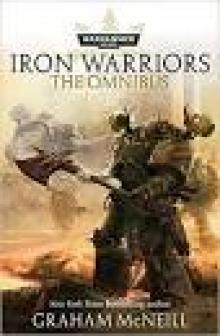 Iron Warriors - The Omnibus
Iron Warriors - The Omnibus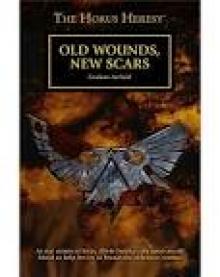 Old Wounds, New Scars
Old Wounds, New Scars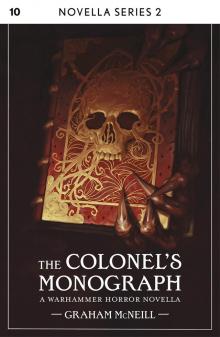 The Colonel's Monograph
The Colonel's Monograph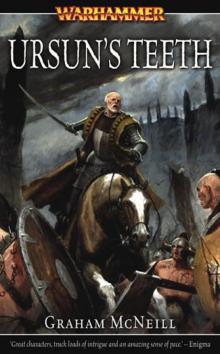 Ursuns Teeth
Ursuns Teeth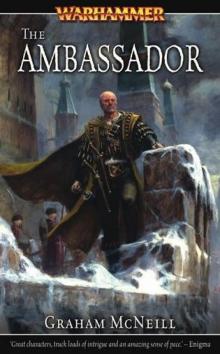 The Ambassador
The Ambassador![[Ultramarines 5] Courage and Honour - Graham McNeill Read online](http://i1.bookreadfree.com/i/03/12/[ultramarines_5]_courage_and_honour_-_graham_mcneill_preview.jpg) [Ultramarines 5] Courage and Honour - Graham McNeill
[Ultramarines 5] Courage and Honour - Graham McNeill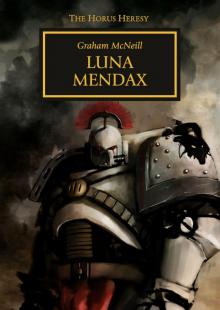 28a Luna Mendax
28a Luna Mendax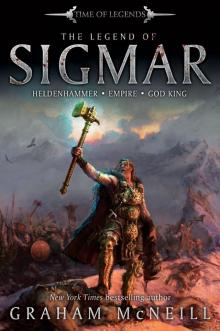 The Legend of Sigmar
The Legend of Sigmar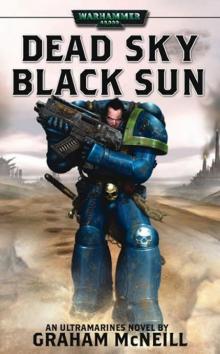 Warhammer - Ultramarines 03 - Dead Sky, Black Sun (McNeill, Graham)
Warhammer - Ultramarines 03 - Dead Sky, Black Sun (McNeill, Graham)![Warhammer - [The Ambassador Chronicles 01] - The Ambassador Read online](http://i1.bookreadfree.com/i/03/17/warhammer_-_[the_ambassador_chronicles_01]_-_the_ambassador_preview.jpg) Warhammer - [The Ambassador Chronicles 01] - The Ambassador
Warhammer - [The Ambassador Chronicles 01] - The Ambassador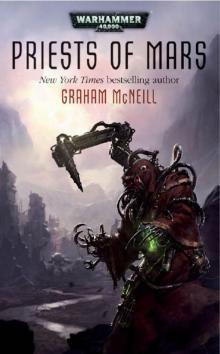 Priests of Mars
Priests of Mars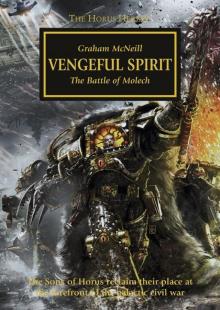 Vengeful Spirit
Vengeful Spirit![[Sigmar 03] - God King Read online](http://i1.bookreadfree.com/i/03/13/[sigmar_03]_-_god_king_preview.jpg) [Sigmar 03] - God King
[Sigmar 03] - God King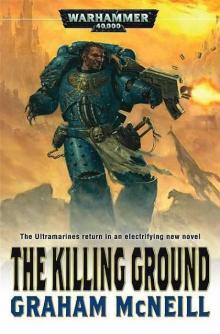 The Killing Ground
The Killing Ground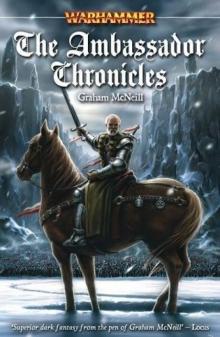 The Ambassador Chronicles
The Ambassador Chronicles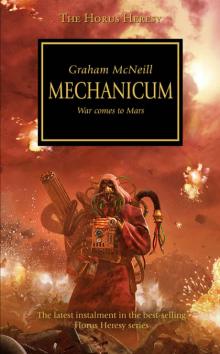 Mechanicum
Mechanicum![[Ulthuan 02] - Sons of Ellyrion Read online](http://i1.bookreadfree.com/i/03/14/[ulthuan_02]_-_sons_of_ellyrion_preview.jpg) [Ulthuan 02] - Sons of Ellyrion
[Ulthuan 02] - Sons of Ellyrion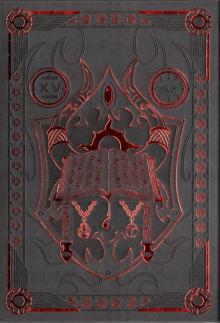 Magnus the Red: Master of Prospero
Magnus the Red: Master of Prospero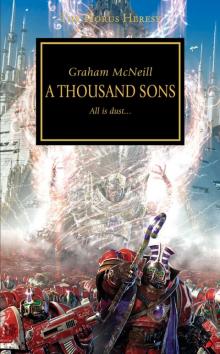 A Thousand Sons
A Thousand Sons![[Warhammer] - Guardians of the Forest Read online](http://i1.bookreadfree.com/i/03/18/[warhammer]_-_guardians_of_the_forest_preview.jpg) [Warhammer] - Guardians of the Forest
[Warhammer] - Guardians of the Forest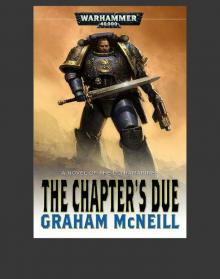 The Chapters Due
The Chapters Due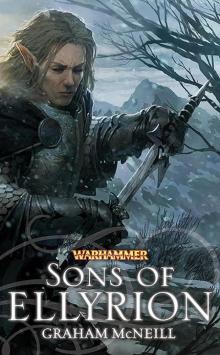 02 - Sons of Ellyrion
02 - Sons of Ellyrion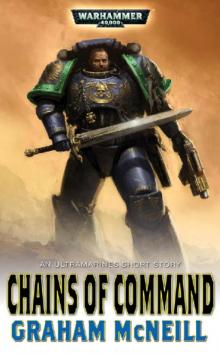 Chains Of Command
Chains Of Command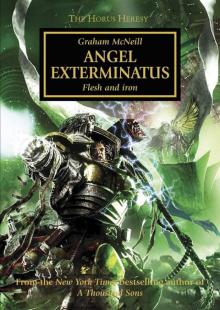 Angel Exterminatus
Angel Exterminatus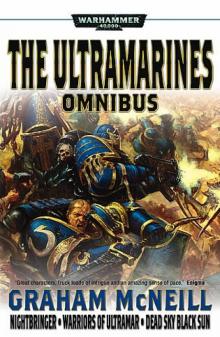 The Ultramarines Omnibus
The Ultramarines Omnibus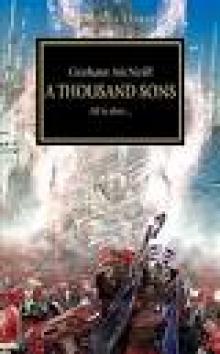 X Marks da Spot
X Marks da Spot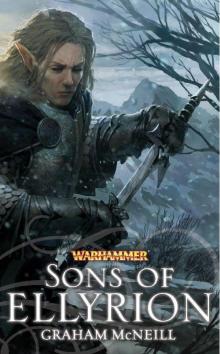 Sons of Ellyrion
Sons of Ellyrion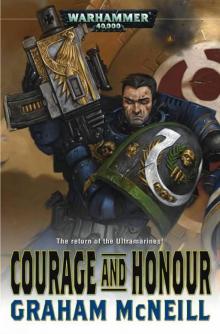 Courage And Honour
Courage And Honour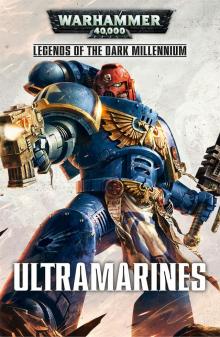 Ultramarines
Ultramarines![[Ulthuan 01] - Defenders of Ulthuan Read online](http://i1.bookreadfree.com/i/03/16/[ulthuan_01]_-_defenders_of_ulthuan_preview.jpg) [Ulthuan 01] - Defenders of Ulthuan
[Ulthuan 01] - Defenders of Ulthuan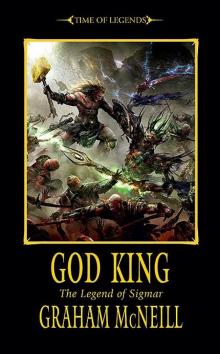 03 - God King
03 - God King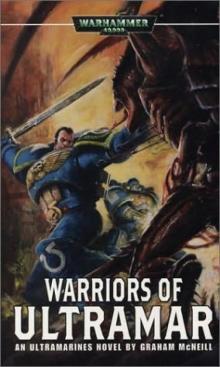 Warhammer - Ultramarines 02 - Warriors Of Ultramar (McNeill, Graham)
Warhammer - Ultramarines 02 - Warriors Of Ultramar (McNeill, Graham)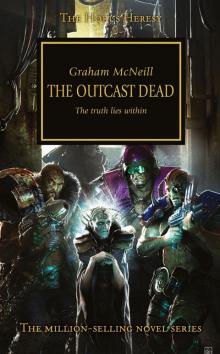 The Outcast Dead
The Outcast Dead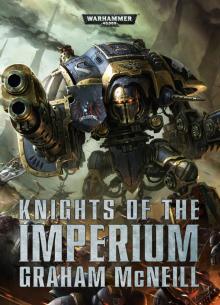 Knights of the Imperium
Knights of the Imperium Defenders of Ulthuan
Defenders of Ulthuan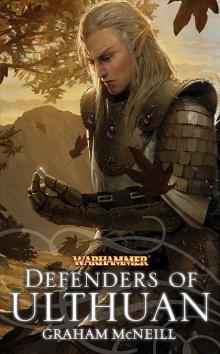 01 - Defenders of Ulthuan
01 - Defenders of Ulthuan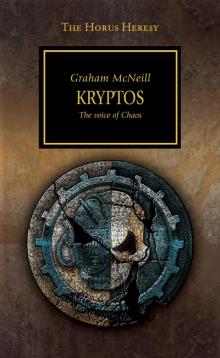 Kryptos
Kryptos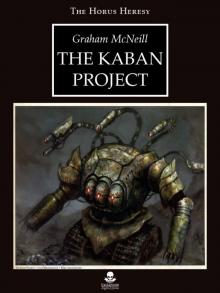 The Kaban Project
The Kaban Project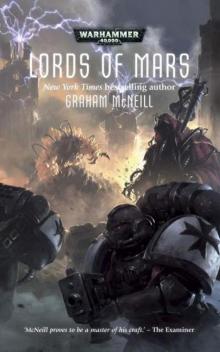 Lords of Mars
Lords of Mars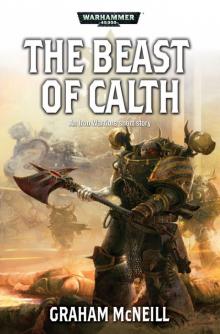 The Beast of Calth
The Beast of Calth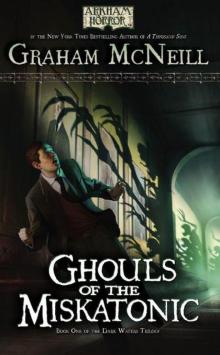 Ghouls of the Miskatonic (The Dark Waters Trilogy)
Ghouls of the Miskatonic (The Dark Waters Trilogy)![[Sigmar 01] - Heldenhammer Read online](http://i1.bookreadfree.com/i/03/24/[sigmar_01]_-_heldenhammer_preview.jpg) [Sigmar 01] - Heldenhammer
[Sigmar 01] - Heldenhammer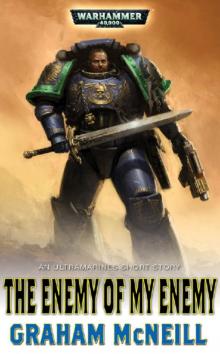 The Enemy Of My Enemy
The Enemy Of My Enemy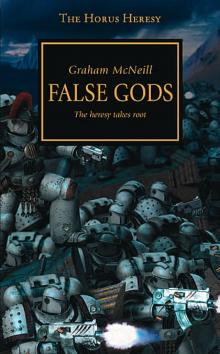 False Gods
False Gods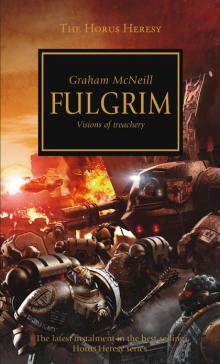 Fulgrim
Fulgrim Mechanicum whh-9
Mechanicum whh-9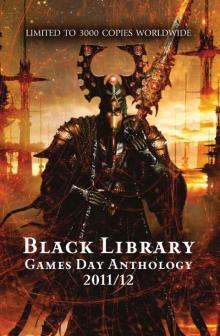 Death of a Silversmith
Death of a Silversmith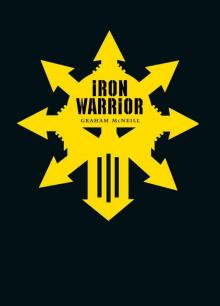 Iron Warrior
Iron Warrior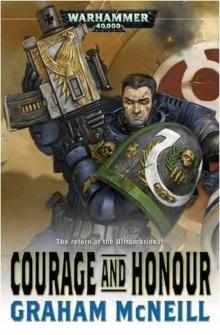 Courage and Honour w4u-5
Courage and Honour w4u-5![[Ultramarines 6] Chapters Due - Graham McNeill Read online](http://i1.bookreadfree.com/i1/03/30/[ultramarines_6]_chapters_due_-_graham_mcneill_preview.jpg) [Ultramarines 6] Chapters Due - Graham McNeill
[Ultramarines 6] Chapters Due - Graham McNeill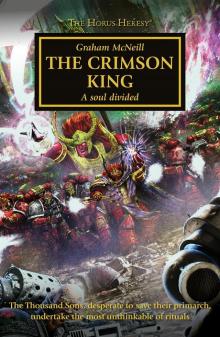 The Crimson King
The Crimson King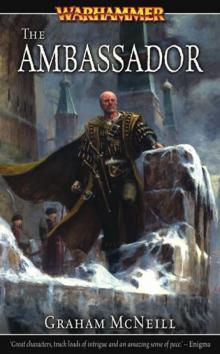 1 the ambassador
1 the ambassador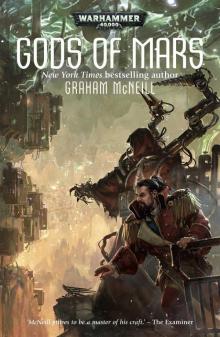 Gods of Mars
Gods of Mars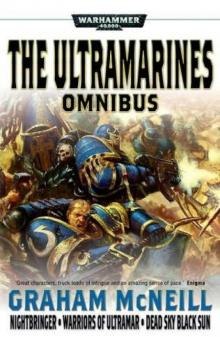 Ultramarines Omnibus (warhammer 40000: ultramarines)
Ultramarines Omnibus (warhammer 40000: ultramarines)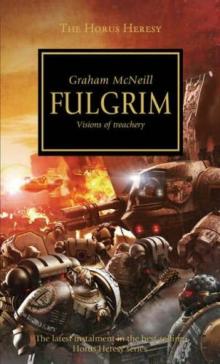 Fulgrim: Visions of Treachery whh-5
Fulgrim: Visions of Treachery whh-5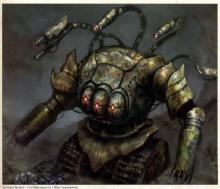 The Kaban Project (warhammer 40000: horus heresy)
The Kaban Project (warhammer 40000: horus heresy)![[Sigmar 02] - Empire Read online](http://i1.bookreadfree.com/i1/04/05/[sigmar_02]_-_empire_preview.jpg) [Sigmar 02] - Empire
[Sigmar 02] - Empire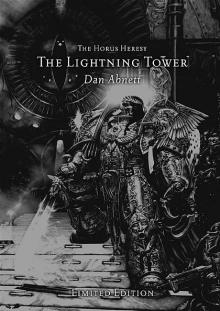 The Lightning Tower & The Dark King
The Lightning Tower & The Dark King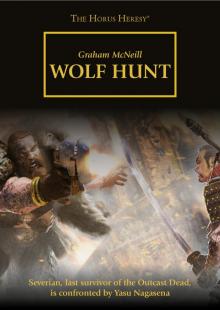 Wolf Hunt
Wolf Hunt Killing Ground w4u-4
Killing Ground w4u-4![Warhammer - [The Ambassador Chronicles 02] - Ursun's Teeth Read online](http://i1.bookreadfree.com/i1/04/05/warhammer_-_[the_ambassador_chronicles_02]_-_ursuns_teeth_preview.jpg) Warhammer - [The Ambassador Chronicles 02] - Ursun's Teeth
Warhammer - [The Ambassador Chronicles 02] - Ursun's Teeth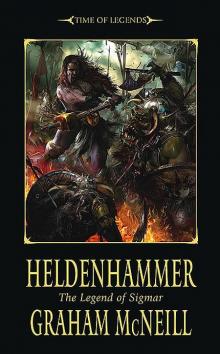 01 - Heldenhammer
01 - Heldenhammer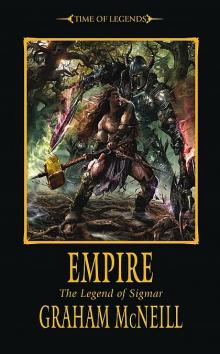 02 - Empire
02 - Empire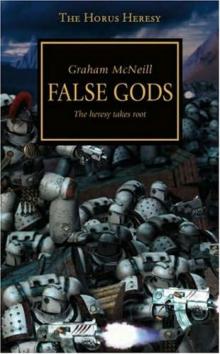 False Gods whh-2
False Gods whh-2